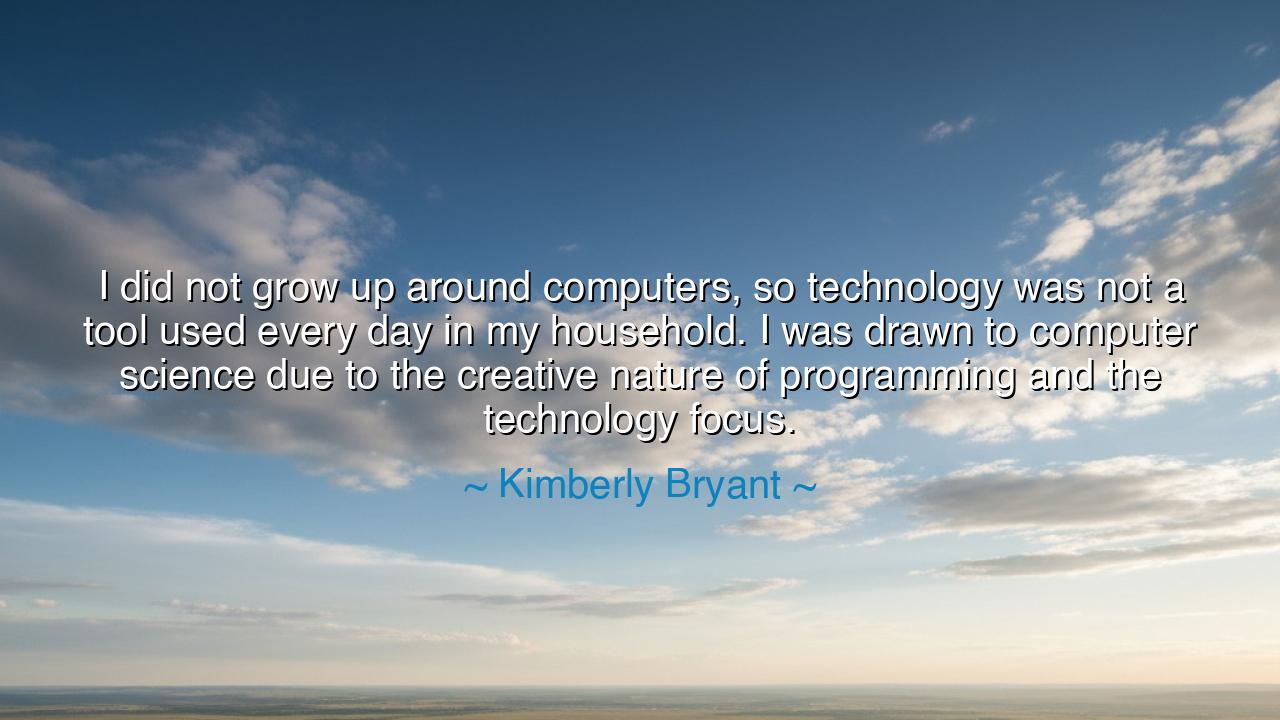
I did not grow up around computers, so technology was not a tool
I did not grow up around computers, so technology was not a tool used every day in my household. I was drawn to computer science due to the creative nature of programming and the technology focus.






"I did not grow up around computers, so technology was not a tool used every day in my household. I was drawn to computer science due to the creative nature of programming and the technology focus." These words, spoken by Kimberly Bryant, reflect a deep and personal journey into the world of technology. Her story is one of discovery, a tale that bridges the gap between the past and the present, between a world that was once dominated by physical tools and a world that now thrives on digital creativity. Bryant’s statement speaks to the power of inspiration and curiosity—how the absence of technology in one’s early life does not limit one’s potential to explore its depths. Rather, it becomes a gateway to a new realm of possibility, drawing her in with the creative potential inherent in the art of programming.
In the ancient world, there was a deep recognition of the power of creativity and innovation. The great Greek philosophers, from Plato to Aristotle, emphasized that human potential lay not in the rigid structures of tradition, but in the creative application of knowledge. Plato, in his dialogue The Republic, spoke of the importance of education in fostering the capacity to create and to engage with the world in ways that challenged the status quo. Bryant’s path mirrors this ancient wisdom: although she did not grow up with technology as a tool in her daily life, her attraction to the creative nature of computer science allowed her to craft her own destiny, just as the ancient philosophers once envisioned the individual shaping their own future through knowledge and imagination.
Consider the tale of Archimedes, one of the greatest minds of the ancient world, who was not born into a family of engineers or mathematicians, yet became the founder of modern science and mathematics. Archimedes’ discovery of the principle of buoyancy came not through a structured curriculum, but through a spark of insight that transformed the world. Much like Bryant, Archimedes was driven by a creative impulse, an inherent curiosity about the world that led him to unravel fundamental truths. His brilliance did not emerge from traditional tools or widespread education, but from his personal drive to create and to push the boundaries of knowledge. Bryant’s journey into computer science reflects a similar spirit: an individual driven by creativity, stepping into an unfamiliar world to uncover innovative solutions.
In modern times, technology has become the new frontier for human creativity. The rise of computers, the advent of programming languages, and the ability to design virtual worlds and solve complex problems have opened up infinite possibilities. But just as in the days of the ancients, those who are drawn to this realm are often not those born into environments steeped in technology. Kimberly Bryant, like many innovators before her, found her calling not because technology was always present in her life, but because of the creative potential that programming offered. She recognized that computer science was not just about machines or data, but about the ability to create something that did not exist before, to shape the digital world in ways that could revolutionize society.
Bryant’s journey is a powerful reminder that creativity is not bound by circumstance or background. Inspiration often comes from unexpected places, and the absence of a resource does not diminish the potential for greatness. Instead, it may foster a hunger to create, to build, and to innovate in ways that others might not have considered. The ancient builders, the creators of great works of architecture and science, often began with nothing but a spark of curiosity and an unyielding will to shape the world. Similarly, those who are drawn to the digital realm—like Bryant—see not just a machine, but a canvas for their own creative expression and innovation.
The lesson here is one of empowerment. It teaches us that no matter our background, no matter the resources at our disposal, we have within us the ability to create and to contribute to the world. Technology may be the tool of the present age, but the creative spirit that drives us is timeless. Whether through art, science, or literature, our capacity to shape the future lies not in our inheritance of material tools, but in our ability to harness our imagination and apply it to the challenges before us. Just as Kimberly Bryant found her path through the power of programming, so too can we all find our own path to create a meaningful impact in the world.
In practical terms, this means that we must embrace creativity in whatever form it takes. Whether we are drawn to technology, art, or science, we must pursue our passions with the belief that we, too, have the ability to shape the world. We must not wait for the right tools or perfect circumstances, but create our own opportunities. Let us be inspired by the likes of Archimedes, Plato, and Bryant, who found their voices and their paths not because the world handed them perfect tools, but because they chose to see potential in the unknown and create something of value from it. Innovation is born from imagination, and it is within each of us, waiting to be unleashed.






AAdministratorAdministrator
Welcome, honored guests. Please leave a comment, we will respond soon